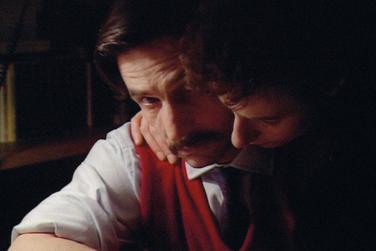
Grandeur et décadence d’un petit commerce de cinéma, Jean-Luc Godard, France-Switzerland, 1986, 92 minutes
The cinema is said to be a dream factory ... And on the side of dreams we find a director, Gaspard Bazin (played by Jean-Pierre Léaud), who is preparing his next film and organising auditions to choose the extras. On the side of the factory we find Jean Almereyda (Jean-Pierre Mocky), a struggling producer who finds it increasingly difficult to obtain financing to get his business proposals off the ground. And between the two of them is the enigmatic Eurydice (Marie Valera), the wife of Almereyda, who wants to be an actress. While Almereyda risks his life to finance the film, Gaspard chooses Eurydice as the protagonist.
NOTES ABOUT THE FILM:
The day that Jean-Luc Godard revolutionised television
In 1984, the producer, director and actor Pierre Grimblat made a proposal to the network TF1, then the most important public television network in France. He put forward the idea of paying tribute to the “Série Noire”, the collection of detective novels that Marcel Duhamel established at the publishing house Gallimard, in 1945.
Grimblat’s production company, Hamster Films, was to set in motion a total of 37 films that would be shown in prime time and would feature renowned directors such as Joël Seria, Yves Boisset, Paul Vecchiali, Jacques Rouffio and Jean-Luc Godard himself. Godard adapted the detective novel The Soft Centre, written by James Hadley Chase. The film was shown only once, on 24 May 1986 at 8:30 p.m., and was never to be released in cinemas.
In Grandeur et décadence d’un petit commerce de cinéma, despite the fact that it was a commissioned work, Jean-Luc Godard transcends the crime fiction genre and mere literary adaptation to address the delicate future of cinema at the hands of the omnipotent television.
In the mid-1980s, the film, made between Hail Mary (1985), Detective (1985) and Soigne ta droite (1987) and King Lear (1987), already questions the future of images in the era of the consecration of TV. Far from regarding it as an enemy of creation, Godard understands that the small screen and video format have a lot to offer. It was a complicated time for the cinema and critics like Serge Daney repeatedly announced its death.
The restoration of the film in DCP has been possible thanks to the careful supervision of the multi-awarded director of photography Caroline Champetier, responsible for lighting and camera work in more than a hundred films (Jean-Luc Godard, Jacques Rivette, Chantal Akerman, Arnaud Desplechin and Léos Carax).
In 'Grandeur et décadence d’un petit commerce de cinéma', despite the fact that it was a commissioned work, Jean-Luc Godard transcends the crime fiction genre and mere literary adaptation to address the delicate future of cinema at the hands of the omnipotent television.
